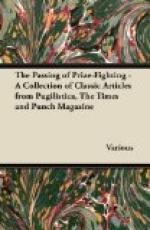That’s a good guess! By the way, the vulgar notion of singing ensemble is totally exploded by these gentry—each professional singer, as a professional singer, sings his very loudest, in justice to himself; if his brethren want physical power, that’s no fault of his, he don’t. Professional singers indulge in small portions of classic lore: among the necessary acquirements is, “Non nobis,” &c. &c.; that is, they consider they ought to know the airs. The words are generally delivered as follows:—Don—dobis—do—by—de. A clear enunciation is not much cultivated among the clever in this line.
In addition to the few particulars above, it may be as well to mention, they treat all tavern-waiters with great respect, which is more Christian-like, as the said waiters never return the same—sit anywhere, just to accommodate—eat everything, to prove they have no squeamish partialities—know to a toothful what a bottom of brandy should be—the exact quantity they may drink, free gratis, and the most likely victim to drop upon for any further nourishment they may require. Their acquirements in the musical world are rendered clear, by the important information that “Harry Phillips knows what he’s about”—“Weber was up to a thing or two.” A baritone ain’t the sort of thing for tenor music: and when they sung with some man (nobody ever heard of), they showed him the difference, and wouldn’t mind—“A cigar?” “Thank you, sir!—seldom smoke—put it in my pocket—(aside) that makes a dozen! Your good health, sir!—don’t dislike cold, though I generally take it warm—didn’t mean that as a hint, but, since you have ordered it, I’ll give you a toast—Here’s—THE PROFESSIONAL SINGER!”
FUSBOS.
* * * * *
AN AN-TEA ANACREONTIC.
[Greek: EIS TO LEIN PINEIN.]
Bards of old have sung the vine
Such a theme shall ne’er be mine;
Weaker strains to me belong,
Paeans sung to thee, Souchong!
What though I may never sip
Rubies from my tea-cup’s lip;
Do not milky pearls combine
In this steaming cup of mine?
What though round my youthful brow
I ne’er twine the myrtle’s
bough?
For such wreaths my soul ne’er grieves.
Whilst I own my Twankay’s leaves.
Though for me no altar burns,
Kettles boil and bubble—urns
In each fane, where I adore—
What should mortal ask for more!
I for Pidding, Bacchus fly,
Howqua shall my cup supply;
I’ll ne’er ask for amphorae,
Whilst my tea-pot yields me tea.
Then, perchance, above my grave,
Blooming Hyson sprigs may wave;
And some stately sugar-cane,
There may spring to life again:
Bright-eyed maidens then may meet,
To quaff the herb and suck the sweet.
* * * * *




